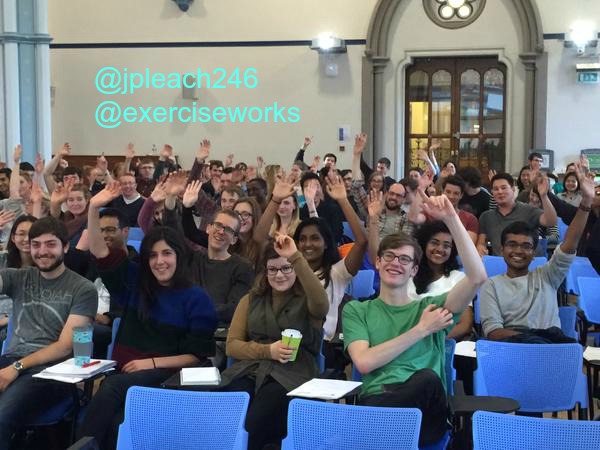By Dr John Paul Leach
Like many clinicians and medical educators, I am convinced of the need to energetically promote physical activity to all strata of society, but especially students and patients.
I am lucky, in that my joint role as an educator and clinician, I have a chance to do just this – promote physical activity for individual patients, and also l educate our future doctors that exercise is a vital [clinical] sign thus, laying the foundations of a grassroots approach to enhance physical activity.

I am a consultant neurologist in Glasgow, and for the last year I have been Head of Fifth Year in the University of Glasgow’s School of Medicine, UK. It is rewarding and productive to wear both hats, in the fight to get people moving more.
One of the main challenges in the campaign to make physical activity part of everyday life, is its inclusion in everyday medical practice. The Scottish Government has rightly become convinced that changing how our population engages with regular physical activity, will secure the long term benefit across all aspects of society and life. The Academy of Medical Royal Colleges has also been unequivocal in its support for promotion of physical activity: recognising the efficacy, and cost effectiveness of physical activity, and its long term benefits in treatment and prevention of many chronic illnesses.
If the notion of increasing counselling and prescription in physical activity in primary and secondary care is to have any chance, it must become part of clinical thinking and practice, and at the earliest stages of medical training.
The School of Medicine at the University of Glasgow has led the way in implementing changes to enhance consideration of physical activity by its students in both personal and professional settings. Three central considerations for Glasgow Medical School are:
- Physical activity promotion became a new theme for one of our sessions in Preparation for Practice and also for a fourth year Academic Day. It was great to see the students respond to the leadership and exhortations by Ann Gates (@exerciseworks) on a “movement for movement” by standing for the entire 45-minute talk! The Twitter and other social media feedback showed their engagement as they heard about the evidence base for the benefits of exercise in medical conditions and rehabilitation, as per the World Health Organization and Chief Medical Officers’ guidance.
This taught material was directly examined in the written finals of the medical school – we suspect anther first for Glasgow!
- If healthcare professionals are to be credible advocates for healthy lifestyles, they need to be visible exponents. Further, the evidence for exercise in preventing career burnout for healthcare workers is developing. For both reasons, we sought to encourage our students to exercise more, including drafting a statement produced by our senior management group, encouraging staff and students to continue regular exercise during term time, unless prevented by fixed teaching commitments.
- Is this making a difference? It is naive to think practice is changing already, but we have begun to audit physical activity discussions in our neurology unit. We suspect this is rarely discussed or documented, but if things keep on like this we expect more such discussions and interventions in coming years!
We see these as the first steps in providing comprehensive advice for patients. The only way to guarantee future positive moves for physical activity promotion is to have continued buy-in by all doctors, especially at a junior level.
The next step is: “it’s time to get the profession and the public, moving”.
We hope that Glasgow Medical School continues to champion the way!
*******************
Dr John Paul Leach, Consultant Neurologist, Honorary Associate Clinical Professor, Head of Fifth Year, Glasgow Medical School, Glasgow, Scotland, UK. JohnPaul.Leach@ggc.scot.nhs.uk and @jpleach246